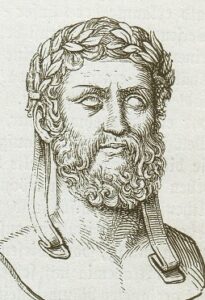Apologia Xenophon 014

Apología de Sócrates
(32-33)
Tabla de contenidos
Ἀπολογία Σωκράτους 014
[32] Σωκράτης δὲ διὰ τὸ μεγαλύνειν ἑαυτὸν ἐν τῷ δικαστηρίῳ φθόνον ἐπαγόμενος μᾶλλον καταψηφίσασθαι ἑαυτοῦ ἐποίησε τοὺς δικαστάς. ἐμοὶ μὲν οὖν δοκεῖ θεοφιλοῦς μοίρας τετυχηκέναι· τοῦ μὲν γὰρ βίου τὸ χαλεπώτατον ἀπέλιπε, τῶν δὲ θανάτων τοῦ ῥᾴστου ἔτυχεν. [33] ἐπεδείξατο δὲ τῆς ψυχῆς τὴν ῥώμην· ἐπεὶ γὰρ ἔγνω τοῦ ἔτι ζῆν τὸ τεθνάναι αὐτῷ κρεῖττον εἶναι, ὥσπερ οὐδὲ πρὸς τἆλλα τἀγαθὰ προσάντης ἦν, οὐδὲ πρὸς τὸν θάνατον ἐμαλακίσατο, ἀλλ᾽ ἱλαρῶς καὶ προσεδέχετο αὐτὸν καὶ ἐπετελέσατο.
Perge ad initium paginae huius
Apologia Sōcratis 014
[32] Es verdad que Sócrates, por hablar de sí con tal alteza y ante el tribunal, excitó sus envidias e hizo que los jueces estuvieran más dispuestos a condenarle. Tengo, con todo, para mí que le ha tocado divina y amable suerte, porque perdió la parte más penosa de la vida, y se le dio género menos doloroso de muerte. [33] Porque cuando se persuadió de que le resultaba más ventajoso morir que continuar viviendo, a la manera como jamás había retrocedido ante los demás bienes, tampoco decayó ante el de la muerte; la recibió y la sufrió con alegría.
Perge ad initium paginae huius
Apology of Socrates 014
[32] And as for Socrates, by exalting himself before the court, he brought ill-will upon himself and made his conviction by the jury more certain. Now to me he seems to have met a fate that the gods love; for he escaped the hardest part of life and met the easiest sort of death. [33] And he displayed the stalwart nature of his heart; for having once decided that to die was better for him than to live longer, he did not weaken in the presence of death (just as he had never set his face against any other thing, either, that was for his good), but was cheerful not only in the expectation of death but in meeting it.
Perge ad initium paginae huius
Conversaciones en el Ātrium Philosophicum
EN CONSTRVCCION

EN CONSTRVCCION
Perge ad initium paginae huius
OFFICĪNA PHILOSOPHŌRVM ***
